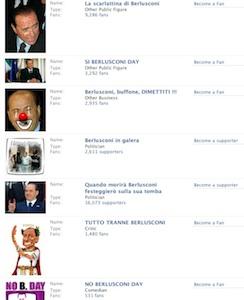In the immediate aftermath of the 13th December attack on Mr Berlusconi, Interior Minister Roberto Maroni blamed social networking sites for nurturing “a climate of violence.”
When, within hours, fan pages for Mr Berlusconi’s assailant Massimo Tartaglia sprung up, along with groups with names such as “Death to Berlusconi”, tempers understandably flared even higher. Politicians in Mr Berlusconi’s party and others began to call for tighter internet controls and until yesterday it seemed that a law enabling these would be passed.
However, in an unexpected about-turn on Tuesday Mr Maroni announced that a solution would be sought using a self-regulatory code for internet providers and social networking site managers. The statement followed a meeting that Mr Maroni had held with representatives of organisations such as Assotelecomunicazioni, British Telecom Italia, Telecom Italia, Vodafone Italia, Google and Microsoft Italia and Facebook. Dario Denni, general secretary of the Associazione italiana internet providers, said that he is hopeful of solution which will satisfy national security requirements without imposing inappropriate responsibility on providers and site managers.
What caused the change of direction on Mr Maroni’s part? Probably several considerations, not least among them the fact that it is one thing to pass a law requiring tighter internet controls but making it work when you are dealing with a constantly changing media is quite another. Secondly, there is the matter of the Italian Constitution, in particular Articles 15 and 21 [1]:
Article 15 [Freedom of Correspondence]
(1) Liberty and secrecy of correspondence and other forms of communication are inviolable.
(2) Limitations may only be imposed by judicial decision stating the reasons and in accordance with guarantees defined by law.
Article 21 [Freedom of Communication]
(1) Everyone has the right to freely express thoughts in speech, writing, and by other communication.
Mr Maroni admitted yesterday that the situation was delicate because of the paramount importance of freedom of expression. A third reason may be the fact that the EU has its eye on any threat to internet freedom and a fourth may well be the eagerness to cooperate shown by the internet providers and site managers themselves.
Mr Maroni is now confident that the government can obtain the result it wants in this instance – which is to guard the freedom of the Italian people whilst ensuring that site managers remove material which could incite serious crime – without new legislation. He has stated that the code must be approved quickly and another meeting will be convened in January.









